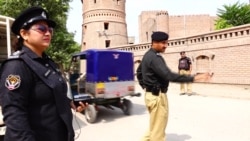Rizwana Hameed made history a month ago when she became the first female head of a male police station in Pakistan’s Khyber Pakhtunkhwa province, or KPK, where conservative cultural and religious traditions often discourage women from leaving home.
Hameed has been a member of the provincial police force for the past 15 years and has participated in numerous crime investigations as well as daring raids against suspected criminal terrorist hideouts.
But after becoming the first officer to supervise a male police station in a predominantly conservative male society, she is feeling the pressure.
Tough job
"It’s a very difficult job for me," she said.
But Hameed is enjoying the job and is determined to undo the impression women are a lesser creed.
“If men are asked to take on household responsibilities and babysitting, for the whole day I don't think they can handle them. Whereas women can easily handle professional responsibilities outside the home also,” she said.
The police officer says women in the surrounding localities have been until now reluctant to enter the police station with their complaints and discuss them openly with male police officers.
“Peshawar is a closed society where women mostly confined to their homes. And even if they are subjected to domestic violence they endure it and avoid publicly talking about it," she said. "But my presence here is now encouraging them to bring problems to the police station and their number is growing by the day. And when their problems are solved they take back a message of satisfaction to their communities, which is emboldening other women to visit the police station."
Tradition
Pashtun families in Pakistan's Khyber Pakhtunkhwa province have been traditionally reluctant to allow their women to join the police. That is why there are hardly 10 percent women police personnel in the entire province. But officials say the trend is changing because of projections in media of women police officers..
“Even some of our female complainants also ask me after their issues are addressed whether they can join the police and I sit down with them to explain the process,” Hameed said.
Police station chiefs in Pakistan, she says, have to spend most of the time in the office, so the doors are open for complainants all the time, making family life a bit difficult even for men officers.
"But my husband and my in-laws are very cooperative with me, even though they know I am not spending enough time with them after assuming my responsibilities as the SHO," Hameed said. "I try to manage both and stay in contact with the family via cell phone because they still need my supervision in some areas."
The provincial police department is also conducting awareness campaigns in woman educational institutions to encourage them to join the force. Hameed said she believes the induction of more women will help bring down incidents of domestic violence and so-called family-honor related crimes against women in the province.
Pakistan's Khyber Pakhtunkhwa province has been at the forefront of the country’s war against terrorism and extremism and has borne the brunt of violent attacks. However, security conditions have improved, encouraging women to look for jobs in areas traditionally considered only for men.






